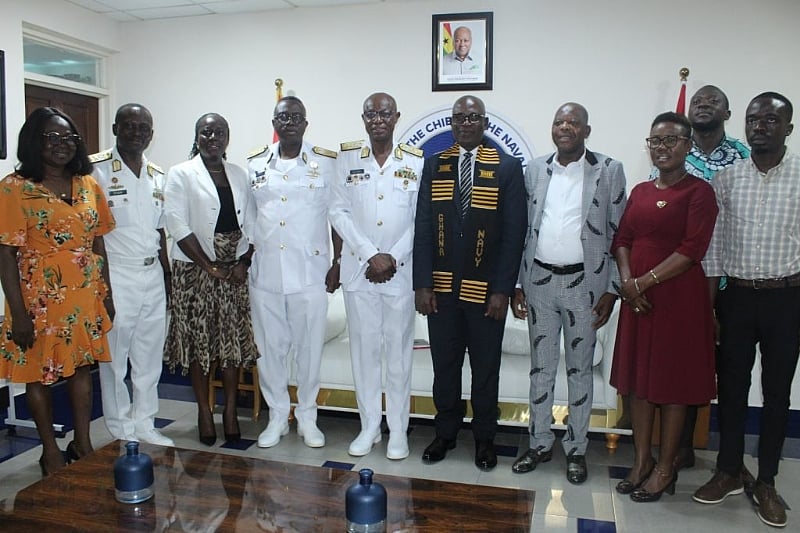The Aircraft Accident and Incident Investigation and Prevention Bureau (AIB) of Ghana, under the leadership of Acting Commissioner John M.K. Wumborti, has initiated a collaborative effort with the Ghana Navy to bolster the nation’s aviation safety and emergency response mechanisms. This partnership underscores the critical role of inter-agency cooperation in managing the complex and multifaceted nature of aviation safety, especially given Ghana’s geographical location and its responsibilities within the Accra Flight Information Region (FIR). The meeting between Mr. Wumborti and Rear Admiral Godwin Livinus Bessing, Chief of the Naval Staff, served as a platform to discuss key areas of cooperation, including capacity building, joint training exercises, and the crucial aspect of search and rescue operations in maritime environments.
The AIB emphasized the importance of the Ghana Navy as a primary partner in ensuring aviation safety, particularly in search and rescue missions within Ghana’s maritime jurisdiction. This partnership is not merely a matter of national interest but stems from international obligations under Annex 13 of the International Civil Aviation Organization (ICAO). This annex designates Ghana, through the AIB, as the responsible body for investigating civil aircraft accidents and incidents occurring within the Accra FIR, a vast airspace encompassing a significant portion of the Gulf of Guinea. The AIB’s role in this context carries both national and international weight, signifying the importance of maintaining high standards of aviation safety and investigation procedures in line with globally recognized protocols.
Alhaji Saani Adams, Technical Adviser to the Acting Commissioner, highlighted the inherent international nature of civil aviation and the interconnected risks it presents. Air travel transcends national borders, creating a complex operational environment where incidents often involve multiple countries and jurisdictions. This interconnectedness underscores the need for seamless cooperation between states and their respective aviation authorities. Mr. Adams reiterated that Ghana’s responsibility under Annex 13 of ICAO is not just a national mandate but a critical international duty. This international dimension necessitates robust collaboration with international partners, including the Ghana Navy, whose maritime expertise and resources are invaluable in responding to aircraft incidents occurring over water.
Furthermore, Mr. Adams emphasized the AIB’s legal mandate under Act 1028, which grants the Bureau the autonomy and authority to conduct independent and professional investigations. This independence is crucial for ensuring the objectivity and credibility of accident and incident investigations, allowing for unbiased analysis and the identification of contributing factors without external influence. The Act reinforces the AIB’s role as the primary investigative body for aviation occurrences within Ghana’s designated airspace, further emphasizing the need for collaboration with other agencies like the Ghana Navy to effectively fulfill its mandate. This legislative framework empowers the AIB to conduct thorough investigations, make recommendations for safety improvements, and ultimately contribute to preventing future incidents.
The importance of stakeholder engagement was also underscored, recognizing that effective aviation safety management requires a collaborative approach involving various agencies and entities. The Ghana Navy, in particular, is a crucial partner in responding to aircraft incidents over the sea, playing a leading role in search and rescue efforts and securing crash sites. This partnership is essential for the timely and effective response to aviation emergencies, ensuring the preservation of evidence and facilitating the investigative process. The collaborative framework envisioned by the AIB aims to streamline communication, coordination, and resource deployment in the event of an aviation incident, optimizing response effectiveness and minimizing the impact of such events.
Rear Admiral Godwin Livinus Bessing, Chief of the Naval Staff, welcomed the collaborative initiative and highlighted the Navy’s commitment to modernizing naval aviation through strategic partnerships. Recognizing the value of this inter-agency collaboration, Rear Admiral Bessing proposed the establishment of a standing committee to further solidify the partnership and streamline coordination during aviation-related maritime incidents. This committee will provide a structured platform for ongoing dialogue, joint planning, and the development of standardized procedures for responding to aviation emergencies. This proactive approach aims to enhance preparedness, improve interoperability between the AIB and the Ghana Navy, and ultimately strengthen Ghana’s overall aviation safety framework. The commitment from both organizations highlights a shared understanding of the importance of proactive measures in mitigating risks and ensuring the safety of air travel within Ghana’s airspace and maritime zones.














